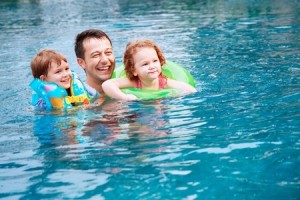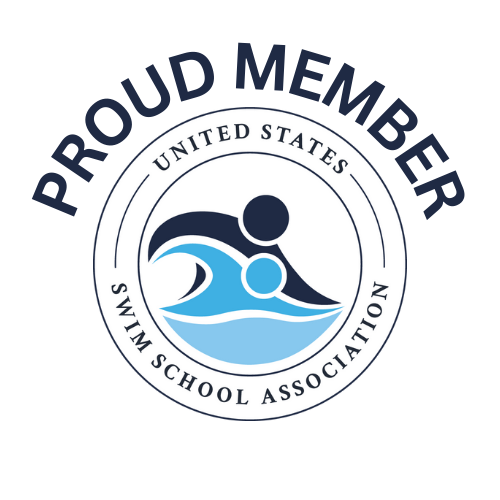IS YOUR FAMILY WATER SAFE?
Some simple advice from British Swim School!
Spring has sprung in Bucks County and even warmer weather and family vacation time is just around the corner. Your children will be in and around the water and now is the perfect time to begin preparing for a SAFE and FUN summer.
It seems like every time you read an article on water safety the same tips are discussed: proper adult supervision, protective pool fences, and alarms on the appropriate doors, among many others. We all read them and agree that these are, indeed, very sound pieces of advice. But at the same time, in the back of four minds, we tell ourselves “nothing terrible will have happen to our kids”.
Sadly, though, it does happen, and more often than anyone realizes A phone call from a friend, a turned back just for a minute, and then the unthinkable happens. Nationwide, drowning is the leading cause of accidental death in children under five years of age and the statistics make for a depressing read. Seventy percent of all preschoolers who drown are in the care of one or both parents at the time and 33% occur at the home of friends, neighbors or relatives. A child can drown in the time it takes to answer a telephone. And still 58% of parents do not consider drowning to be a threat to their children.
Drowning for the most part is totally preventable and here at the British Swim School we believe strongly in a multi faceted approach to water safety. Here are a few tips that will assure your time around the pool (or indeed any body of water) is a SAFE and FUN experience.

- Constant vigilance – never take your eyes off your children, not even to answer the phone. Delegate a responsible ‘Pool Watcher’ during parties or family events that are held around the pool.
- Have a cell phone close by when you or your family are using a pool or spa.
- If a child is missing, look for him or her in the pool or spa first.
- Understand the basics of life-saving so that you can assist in a pool emergency.
- Learn to perform CPR on children and adults – so many children die or are permanently brain damaged because CPR wasn’t performed in the time it took for emergency services to arrive. Courses are readily available so there is no excuse. Everyone in your family should be able to perform CPR.
- Share safety instructions with family, friends and neighbors.
- Teach your kids to swim! It seems obvious but statistics show that the majority of children who drown had not been taught basic water survival skills. Ballet, karate, soccer and the like are all commendable activities but only swimming lessons could potentially save your little one’s life. Statistics indicate that children who take lessons from an accredited water safety program, reduce their chances of drowning by 88%. As with any developmental activity, swimming skills need to be practiced in order to be retained. Many parents make the mistake of stopping lessons once kids go back to school in the fall and are amazed they’ve regressed so much by the time spring comes around again.
- Be aware of the dangers of being in or around water. Young children are naturally drawn to water and do not comprehend how dangerous it can be.
- Don’t let a few tears put you off. Many years ago a brother and sister (Danny and Bailey) started swimming with us at another location. Bailey did great but Danny cried for nearly every class he attended. After a couple of months, mom withdrew him from lessons, unable to deal with the tears each week. Less than a month later she called to re-enroll him. Why the change of heart? She’d been gardening while Danny ran around playing. She didn’t notice him sneak through the pool gate nor did she hear him fall into the pool. What she did hear was him crying. Frantic, she searched for him and eventually found him floating on his back in the middle of the pool. Crying but alive!
There is plenty you can do at home to educate your children about water safety and to acclimate your kids to the water. Talk to them about ‘what would happen if..’ and come up with safety measures they can understand and carry out. Teach them not to go into the pool if a friend has fallen in Instead tell them to look for anything that floats that they can throw into the pool to help (we call it ‘Throw, don’t go!’). Teach them emergency numbers and how to call 911. Make sure they understand to shout out for help. All these can be valuable life saving skills and save precious minutes in a water accident.
Make bath-time fun and encourage your child to get their head, eyes and ears wet. Encourage them to blow bubbles and to put their faces in the water. All of these better acclimate a child to the water and help when starting swim lessons. Finally start lessons early so that your children are ready to enjoy their summers safely!





